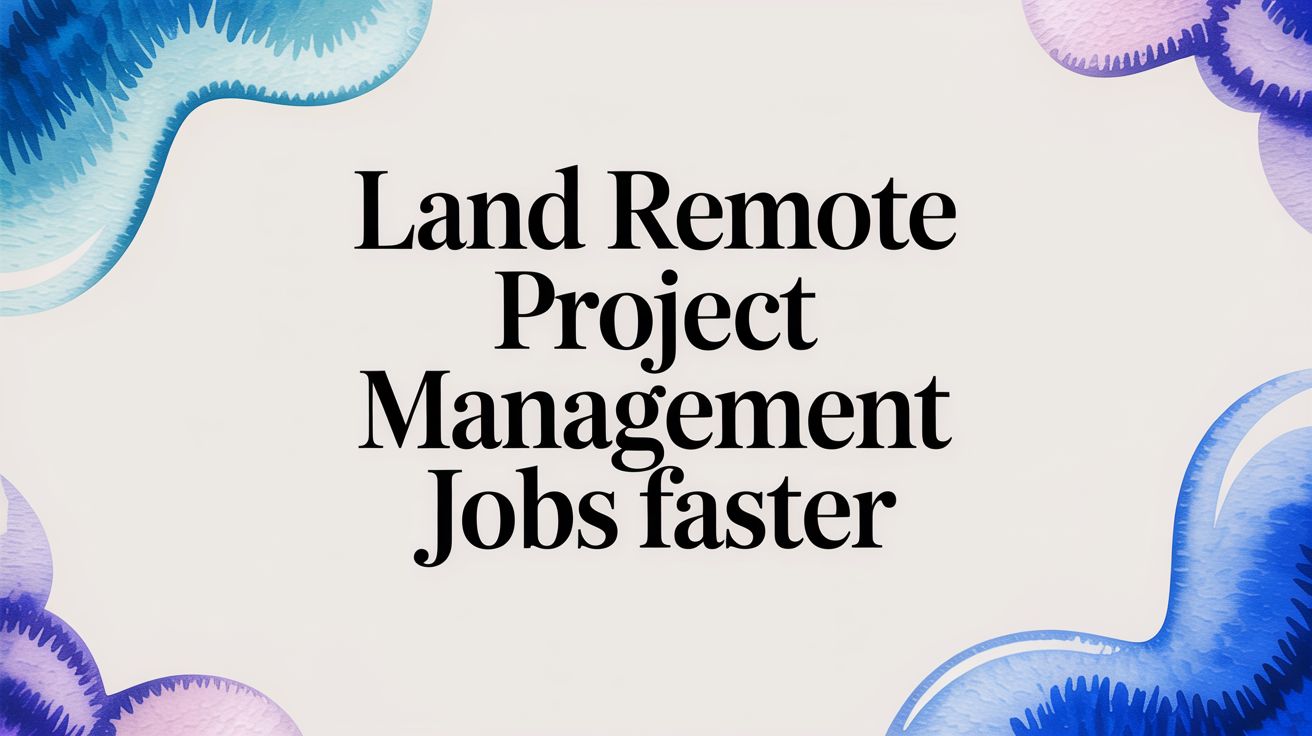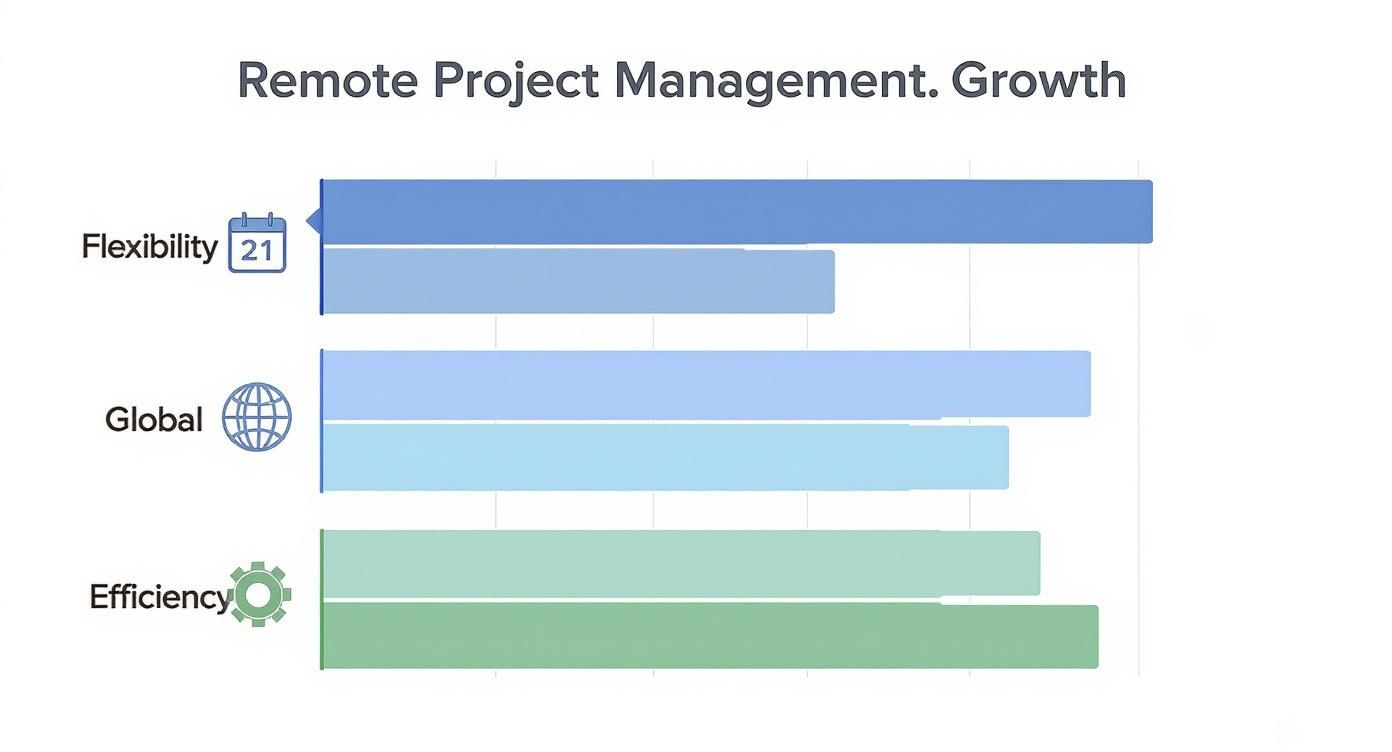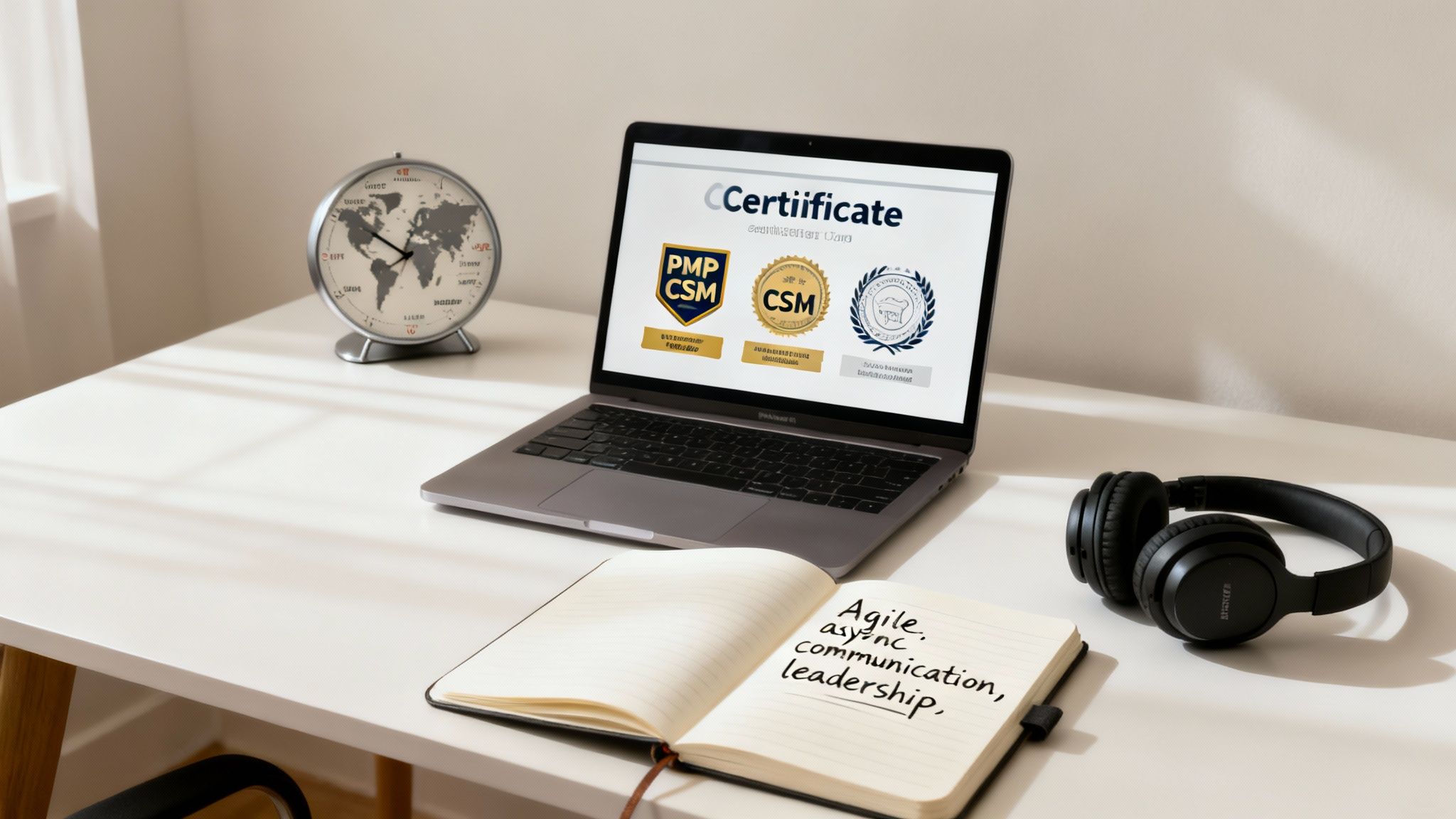Land Remote Project Management Jobs Faster

If you've got a talent for steering projects to the finish line, you're in luck. The demand for leaders who can manage teams and tasks from anywhere is through the roof, making remote project management jobs one of the most solid career moves you can make right now. This isn't just about the convenience of working from your home office; it's a real shift in how businesses get things done.
Why Remote Project Management Is a Career Goldmine
The working world has changed for good, and remote work is at the heart of it. Companies are no longer fishing for talent in their local pond; they're casting a net across the entire globe to build their dream teams. But a team spread across different cities and time zones needs a special kind of leader to keep everything moving forward. That's where the remote project manager comes in.
Think of this role as the central nervous system for a distributed team. You're the one ensuring everyone is communicating, collaborating, and hitting their deadlines, no matter where they're logging in from. As more companies go fully remote or adopt a hybrid model, they desperately need people who are masters of this digital-first environment.
The Benefits for You and the Business
For anyone looking for a new role, the appeal is obvious. Landing a remote project management job gives you a kind of flexibility and independence that’s hard to find in a traditional 9-to-5. You get to tackle meaningful work while creating a schedule that actually fits your life.
It's a win for companies, too. By hiring remote PMs, they can tap into a much larger and more diverse pool of applicants, cut down on office expenses, and often see a big boost in efficiency. A great remote PM keeps projects humming along smoothly, which is a direct win for the company's bottom line.
This isn't just a passing trend. Businesses now see strong remote project leadership as a genuine competitive edge. These roles aren't just a "nice-to-have" anymore; they're essential for any company looking to grow.
Unlocking a World of Opportunity
When you decide to go after these roles, you're not just looking for another job. You're stepping into a field with serious long-term career security. The skills you'll sharpen—like mastering asynchronous communication and leading people you've never met in person—are becoming incredibly valuable everywhere.
Here’s what makes this such a smart move:
- Industry Agnostic: From tech startups and healthcare systems to marketing agencies and financial firms, everyone needs good project management. You can find a role that fits your specific passions.
- Clear Career Progression: There’s a well-worn path from project coordinator to senior project manager, program manager, or even director. The opportunities to grow your title and your salary are built right in.
- Future-Proof Skills: You’ll become an expert in the digital tools and leadership techniques that define the modern workplace. These are skills that will only become more essential over time.
In the end, focusing on remote project management puts you right at the center of how work gets done, both today and in the future.
Decoding Job Titles and Realistic Salary Ranges
When you start searching for remote project management jobs, you'll quickly find that "Project Manager" is just the beginning. The job title is often a signal, hinting at the role's specific industry, seniority, and the type of methodology you'll be using. Learning to read these signals is your first step to finding the right opportunities and steering clear of ones that aren't a good match.
Think of it like being a chef. "Chef" is a broad term, but "Pastry Chef," "Sous Chef," and "Executive Chef" all point to vastly different skills, responsibilities, and daily pressures. It’s the same in project management. A "Technical Project Manager" lives and breathes software development cycles, while a "Marketing Project Manager" is all about orchestrating creative campaigns and product launches.
Common Remote Project Management Job Titles and Key Responsibilities
To help you get your bearings, let's look at some of the most common job titles you'll come across. Each role is built on a core project management foundation but has a unique spin that defines the day-to-day work.
| Job Title | Primary Focus | Common Responsibilities |
|---|---|---|
| Technical Project Manager | Managing software development and IT projects | Working with engineering teams, managing sprints, understanding tech concepts like Agile or Scrum. |
| Agile Project Manager / Scrum Master | Facilitating Agile methodologies | Leading daily stand-ups and retrospectives, removing roadblocks for the development team, championing Scrum principles. |
| Program Manager | Overseeing multiple related projects for a strategic goal | Focusing on long-term objectives, managing a portfolio of projects, high-level stakeholder communication. |
| Project Coordinator | Supporting project managers with administrative and organizational tasks | Scheduling meetings, tracking documents, handling updates. An excellent entry point into the field. |
Understanding these distinctions helps you filter your search more effectively. If you're passionate about process and team dynamics, a Scrum Master role might be perfect. If you love seeing the big picture come together, Program Manager could be your next step.
Setting Realistic Salary Expectations
Let's talk money. Salary is obviously a huge part of any job hunt, and for remote project management, the numbers can be all over the place. Your earning potential isn't some single national average; it’s a mix of your experience, the industry you’re in, and the company's size and stage.
This infographic sheds some light on why remote project management is booming, touching on the drive for flexibility, better talent access, and overall efficiency.

These very factors are what influence pay. Companies that are serious about building a skilled, global workforce know they need to pay competitively to attract top-tier project leaders.
For example, the tech and startup worlds are hotspots for these roles. Right now, the average salary for a remote Project Manager in a U.S. startup hovers around $74,250 per year. But that's just an average—the actual range is massive, stretching from $30,000 on the low end to $175,000 for senior roles in high-demand fields.
Industry matters. A lot. Project managers in the SaaS (Software as a Service) space, for instance, earn an average of $80,000, which is well above the general average. Experience is another key piece of the puzzle, with PMs who have 4-6 years under their belt typically earning around $75,000. You can dig deeper into these numbers and explore more salary insights for remote startups.
Key Takeaway: Don't get stuck on one number. Do your homework. Research salary ranges specific to your target industry (e.g., "SaaS remote project manager salary") and your experience level. This will give you the confidence to negotiate for what you're worth and find roles that truly meet your financial goals.
Building Your Remote-Ready Skills and Certifications

When you're gunning for a remote project management job, your skills and certifications are everything. You can't just build rapport over a coffee run or sketch out an idea on a conference room whiteboard. Instead, your proven abilities become the bedrock of trust between you, your team, and your boss. It's not just about managing tasks anymore; it's about proving you can lead, communicate, and get results from anywhere on the map.
Think of it like this: a traditional PM is like a symphony conductor who can see every musician in the orchestra pit. A remote PM, on the other hand, is conducting musicians who are all playing from their own homes, scattered across different time zones. The sheet music—your hard skills and methodologies—has to be perfect. But the real magic comes from your ability to create harmony without ever being in the same room.
Mastering Essential Hard Skills
Hard skills are the technical nuts and bolts of project management. They’re the frameworks and processes that turn a chaotic mess of ideas into a structured, successful project. For remote roles, hiring managers are looking for a few key things to prove you can handle complex work in a digital-first environment.
- Agile and Scrum Methodologies: In tech and software, these are basically non-negotiable. You have to know how to lead sprints, run daily stand-ups, and manage a product backlog in tools like Jira or Asana, all with a team that's completely distributed.
- Risk Management: Spotting potential problems before they blow up is even more critical when you can't rely on those casual "drive-by" office conversations. You need a solid, repeatable process for tracking risks and clearly communicating your backup plans to stakeholders you might only see on a weekly video call.
- Budgeting and Financial Forecasting: Being able to manage the money side of things—tracking expenses, staying on budget, and reporting on the financial health of your project—is a core skill that has nothing to do with location. It shows you’re a business-minded leader, not just a task-master.
These skills are your ticket to the dance. They’re the first thing a recruiter will scan your resume for, and they show you understand the fundamental mechanics of getting things done.
The Soft Skills That Set You Apart
While hard skills get you in the door, it's your soft skills that will actually make you a successful remote project manager. These abilities are put under a microscope in a remote setting because they directly tackle the biggest challenges of distributed work: communication, trust, and team morale.
In a remote setting, over-communication is the baseline, not the exception. The ability to convey clarity, tone, and urgency through text is a superpower that prevents misunderstandings and keeps projects moving forward.
Here are the soft skills that truly make a difference:
- Asynchronous Communication Mastery: You need to be an absolute pro at writing clear, concise, and actionable updates in tools like Slack or email. Your team should never be left guessing what to do next just because they live in a different time zone.
- Proactive Leadership: You can't manage by walking around when there's no office to walk around in. You have to be intentional about checking in with your team, anticipating what they need, and knocking down roadblocks before they even have to ask for help.
- Digital Conflict Resolution: Disagreements are going to happen. But trying to solve them over a video call requires a much higher level of emotional intelligence. You need to be great at reading digital body language, making people feel safe to speak up, and guiding conversations toward a productive solution.
These aren't just "nice-to-haves." They're the critical skills that separate an average remote PM from an exceptional one.
Demystifying Project Management Certifications
Certifications can be a powerful signal to employers, but let's be real—not all of them are created equal. They basically act as a third-party stamp of approval on your knowledge and dedication. The trick is to pick the right one for the kind of remote PM jobs you're actually trying to land.
The demand for project managers is absolutely booming. Projections show that an additional 30 million professionals will be needed by 2035. The U.S. alone already has over 426,000 project managers, with that number expected to grow by 7% between 2023 and 2033. Having a certification like the PMP can even boost your salary—some studies show it can increase a median salary by around 33%. This data makes it clear: verified skills get rewarded. You can find more project management statistics on monday.com.
Here’s a quick rundown of the big players:
- Project Management Professional (PMP): This is often seen as the gold standard. The PMP is perfect for roles that use traditional, predictive project management, and it’s highly respected by larger, more established companies. You'll see it listed as a requirement all the time.
- Certified Associate in Project Management (CAPM): This is an excellent entry-level cert from the same people who issue the PMP. It shows you've got the foundational knowledge down, which is great if you're trying to land your first project coordinator or junior PM gig.
- Certified ScrumMaster (CSM) or Professional Scrum Master (PSM): If you're aiming for a job in tech, SaaS, or any industry that lives and breathes Agile, these are must-haves. They prove you're an expert in the Scrum framework and can lead an Agile team effectively.
At the end of the day, the right certification comes down to your career goals. A PMP shows you have broad leadership skills, while a CSM signals you have deep, specialized expertise in a methodology that's in incredibly high demand.
Mastering the Modern Remote Tech Stack

When you're leading a remote team, your tech stack isn't just a set of tools—it's your office. It's the hallway where conversations happen, the whiteboard where ideas take shape, and the filing cabinet that keeps everything organized. Being a great remote PM means you're not just familiar with these tools; you're fluent in them.
Your ability to navigate this digital environment is what proves you can keep a project on track when your team is spread across different cities, or even continents. It’s about more than just knowing of the software; it's about understanding how to use it to keep everyone connected, informed, and moving forward.
Core Project Management Hubs
Think of these platforms as your project's command center. This is where the plan lives, where tasks are assigned, and where everyone goes to answer the two most important questions: who is doing what, and by when? Getting comfortable with at least one of these is non-negotiable.
- Jira: In the world of software development, Jira is king. It's built from the ground up for Agile teams, making it perfect for managing complex development cycles, tracking bugs, and running sprints. If you're aiming for a role in tech, you're expected to know your way around it.
- Asana: With its clean, visual interface, Asana is a huge hit with marketing, creative, and operations teams. It really shines when it comes to mapping out project timelines, showing how tasks depend on each other, and creating simple dashboards that keep stakeholders in the loop.
- Trello: Trello’s magic is its simplicity. It uses a Kanban-style system of boards, lists, and cards that’s incredibly easy to pick up. For smaller projects or teams who just need a clear, visual way to track progress from "To-Do" to "Done," it's fantastic.
Communication: The Lifeblood of Remote Teams
Clear communication is what separates successful remote projects from chaotic ones. You can't just pop by someone's desk to ask a quick question. A seasoned remote PM knows exactly which tool to use for which conversation—a quick chat for an urgent issue, and a documented thread for bigger decisions.
When your team is distributed, you lose all the informal cues—body language, overheard conversations, the buzz of a busy office. Your real skill as a remote PM is creating that same sense of clarity and connection using only digital tools.
To really get a feel for the modern remote toolkit, you need to understand how different platforms work together to create a seamless virtual workspace. Here’s a quick breakdown of the essentials.
Essential Remote Project Management Tool Comparison
| Category | Tool Example | Primary Use Case for Remote PMs |
|---|---|---|
| Project Hub | Jira | Managing complex software development sprints and tracking technical tasks. |
| Communication | Slack | Facilitating quick, real-time conversations and creating dedicated channels for specific projects or topics. |
| Documentation | Notion | Building a centralized wiki for project briefs, meeting notes, and team processes. |
| Video Conferencing | Zoom | Hosting daily stand-ups, stakeholder meetings, and virtual team-building events. |
This combination ensures there's a designated spot for every type of interaction, from rapid-fire problem-solving in Slack to building a long-term knowledge base in Notion. To see even more options, our guide on remote team collaboration tools is a great next step.
Why This Tech Fluency Matters
This isn't just about preference; it's about performance. Right now, around 61% of project professionals work remotely at least one day a week, a reality made possible entirely by this kind of software. The proof is in the numbers: companies that lean into project management tools complete 61% of their projects on time, compared to just 41% for those who don't.
So when you get to the interview, don't just list the tools you've used. Tell a story. Talk about the time you used Asana’s timeline to catch a major dependency issue before it derailed a launch, or how you set up specific Slack channels to cut down on unnecessary meetings. That’s what shows you don’t just know the software—you know how to make a remote team win with it.
Finding and Winning the Best Remote PM Jobs

Having the right skills and knowing the tech is only half the battle. Knowing where to look and how to present yourself is what actually lands you the job. Searching for a great remote project management job isn't about blasting your resume everywhere; it’s about a smart, targeted strategy.
Think of it like fishing. You could cast a massive net in the open ocean and hope for the best, or you could go to the specific spots where you know the fish are biting. Niche job boards and remote-first communities are those prime fishing spots, full of opportunities from companies that truly get remote work.
Where to Find High-Quality Remote PM Jobs
Sure, you can start with the giant, general job boards, but they’re often a sea of noise. It's tough to tell which companies are genuinely remote-friendly versus those just dipping a toe in the water. To find the best roles, you need to get more focused.
- Remote-First Job Boards: This is your best bet. Sites like RemoteWeek, We Work Remotely, and Remotive only list remote positions. The companies posting here are already committed to distributed work, which means you’ll find roles with the right culture and support from day one.
- Industry-Specific Communities: If you’re a Technical PM, dive into tech-focused Slack communities or niche job boards. For Marketing PMs, great leads often pop up in marketing forums or industry newsletters. Go where your people are.
- Company Career Pages: Make a dream list of remote-first companies you admire and bookmark their career pages. Some of the best roles never even make it to a public job board.
Your job search strategy should mirror the skills of a great remote PM: intentional, focused, and efficient. Don't waste time scrolling through thousands of irrelevant listings; target the places where genuine remote roles live.
By zeroing in on the right places, you not only save a ton of time but also dramatically increase your odds of finding a role that’s a perfect fit. For a deeper dive on this, check out our guide on how to find remote jobs that align with your career goals.
Crafting a Resume That Screams “Remote-Ready”
Your resume is your opening pitch. For a remote role, it has to do more than just list job duties—it needs to prove you can thrive without someone looking over your shoulder. You have to show, not just tell, that you're disciplined, proactive, and a stellar communicator.
The trick is to weave remote-specific language and metrics throughout your experience.
Instead of this:
- Managed a team to complete Project X.
Try this:
- Led a fully distributed team of 8 engineers across 5 time zones to deliver Project X 15% ahead of schedule, using Jira and Slack for all daily stand-ups and progress tracking.
See the difference? The second version immediately paints a picture of your experience with distributed teams, the exact tools you used, and a concrete, measurable win.
Here’s how to translate your experience into remote-ready bullet points:
- Emphasize Asynchronous Communication: Talk about how you used tools like Notion or Asana to create a single source of truth for your projects, cutting down on unnecessary meetings.
- Highlight Self-Discipline: Use powerful action verbs that scream autonomy, like "initiated," "drove," or "independently managed."
- Showcase Results: Every bullet point should connect what you did to a positive business outcome. Did you save money, boost efficiency, or improve team morale? Spell it out.
Writing a Cover Letter That Proves Your Remote Fit
The cover letter is your chance to connect the dots for the hiring manager. This is where you tell the story of why you’re not just a good project manager, but a great remote project manager. It’s your opportunity to show you understand the unique rhythm and challenges of a remote-first culture.
Don’t just repeat your resume. Instead, show that you’ve done your homework and are genuinely aligned with how they work.
- Acknowledge Their Culture: If the job description emphasizes asynchronous work, share an example of how you've excelled in that kind of environment.
- Share a Relevant Story: Tell a quick story about a time you solved a communication snag on a remote team or launched a complex project with stakeholders scattered across the globe.
- Express Genuine Interest: Make it clear you're not just looking for any work-from-home gig. Explain why you're excited about their mission and how you can help them succeed as a remote team member.
Think of your application as your very first project. By targeting your search and crafting your materials with care, you’re already demonstrating the planning and communication skills that make a remote project manager invaluable.
How to Ace the Remote Interview Process
You’ve built a stellar resume, impressed the recruiter, and now it’s time for the final hurdle: the video interview. Don't make the mistake of treating this like a standard interview that just happens to be on a screen. For a remote role, this interview is your first real test. Hiring managers are watching to see if you can truly lead a team from a distance, and how you manage the technology and your environment is part of that evaluation.
Think of the video call as your first assignment. Your project is to demonstrate your value, professionalism, and communication skills using only digital tools. Success here comes down to a mix of smart preparation and sharp strategy.
Setting the Stage for Success
Before you say a single word, your interview space is already talking. A cluttered background, a shaky internet connection, or poor audio can scream disorganization—a death knell for any project manager.
First things first, do a full tech rehearsal. Jump on a quick call with a friend to test your camera, microphone, and internet stability. Get comfortable with the video software, whether it's Zoom, Google Meet, or Microsoft Teams. Nothing undermines confidence faster than fumbling with settings live on the call.
Next, curate what the interviewer sees. Your background needs to be clean, professional, and completely free of distractions. A neutral wall or a tidy bookshelf is perfect. You can also use a simple, professional virtual background if your space isn't ideal. Make sure you’re well-lit from the front so your face is clear, and do everything you can to eliminate potential noise from pets, family, or traffic.
Key Takeaway: The goal is to make the technology and your environment invisible. When everything runs smoothly, the focus shifts entirely to your skills and personality, proving you've already mastered a critical component of remote work.
Answering Remote-Specific Questions
You'll get the usual behavioral questions, but expect another layer of inquiry aimed directly at your remote leadership capabilities. Managers need to feel confident you can build a strong team, keep everyone accountable, and drive projects forward without ever sharing an office. For a deep dive into what to expect, take a look at our guide on common remote job interview questions.
Be ready with solid examples for questions like:
- How do you build team cohesion when you've never met your colleagues in person? Talk about your specific strategies. Maybe you schedule virtual coffee chats, create non-work-related channels in Slack for casual conversation, or always start meetings with a few minutes of personal check-ins.
- Walk me through your process for managing projects across multiple time zones. This is your chance to shine. Explain how you rely on asynchronous communication tools, set clear "core hours" for real-time collaboration, and over-communicate through detailed documentation so everyone is on the same page, no matter when they log on.
Staying Safe and Spotting Scams
As you navigate your job search, you have to keep your guard up. The anonymity of the internet is a magnet for scams, and it's crucial to know the red flags.
Here are a few classic warning signs that an "opportunity" isn't what it seems:
- Vague Job Descriptions: A real role will have specific, detailed responsibilities. If it's all fluff, be suspicious.
- On-the-Spot Offers: Legitimate companies have a multi-step hiring process. An instant job offer after a brief chat is a huge red flag.
- Requests for Personal Financial Info: You should never have to provide bank details or pay for equipment before you've signed an official offer and started onboarding.
- Unprofessional Communication: Look out for sloppy grammar, emails coming from a personal address (like a Gmail account instead of a company domain), or interviews conducted entirely over a text-based chat.
Always trust your gut. If a job offer feels too good to be true or the hiring process seems rushed and unprofessional, it probably is. A great company will always treat you with respect and conduct a thorough, professional interview process.
Your Top Questions About Remote PM Careers, Answered
As you start looking into remote project management, you're bound to have some questions. Let's tackle a few of the most common ones I hear so you can get a clearer picture of what to expect.
Do I Absolutely Need Previous Remote Work Experience?
Not always, but it definitely helps you stand out. If you haven't officially worked remotely before, the trick is to highlight your transferable skills. Think about times you've worked with minimal supervision or collaborated with people who weren't sitting next to you.
Did you manage projects with stakeholders in different offices? Were you the go-to person for keeping everyone connected using tools like Slack or Trello? Frame those experiences to show you’ve got the self-discipline and communication chops to thrive without someone looking over your shoulder.
For instance, instead of just saying you "led weekly meetings," try something more specific: "Coordinated project updates across departments using Asana and Zoom, ensuring alignment with teams in both the New York and London offices." That little tweak shows you're already thinking like a remote PM.
Which Industries Have the Most Remote PM Jobs?
Project management is everywhere, but a few industries are way ahead of the curve when it comes to hiring remote PMs. These are usually sectors that were either born digital or adapted quickly to distributed work.
- Tech and SaaS: This is the big one. Software companies are constantly managing development cycles, product launches, and IT projects, and they're very comfortable with remote teams.
- Marketing and Advertising: Think about coordinating a big campaign—you've got writers, designers, and strategists who could be anywhere. Remote PMs are essential for keeping all those moving parts in sync.
- Healthcare IT: It might sound traditional, but the healthcare industry is leaning heavily on technology. They need savvy PMs to manage things like electronic health record (EHR) rollouts and other complex tech projects.
- Consulting: Consultants often work from client sites or home offices, so managing projects from a distance is built into the business model.
Is It Possible to Land an Entry-Level Remote PM Role?
Honestly, it's tough but not impossible. The reality is that most companies want to see a proven track record before they hand over the keys to a project remotely. Because of that, true entry-level remote PM jobs are pretty competitive.
A smarter move if you're just starting out is to look for Remote Project Coordinator or Junior Project Manager positions. These roles are a fantastic way to get your foot in the door. You’ll learn the fundamentals of managing projects in a distributed setup and build the experience you need to step into a full PM role down the line.
Ready to stop scrolling and start applying? RemoteWeek cuts through the noise and curates the best remote project management jobs out there. Find your next opportunity today.
